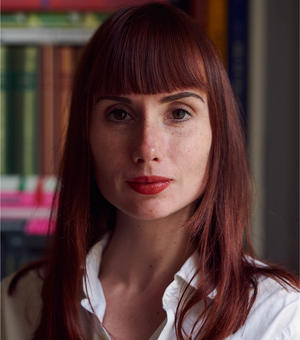Manon Gibot
Please tell us about your research project.
The thesis I am currently working on at the École Pratique des Hautes Études and at the Laboratoire d’études sur les monothéismes is entitled « A Heart at War : The history of an Organ Conceived as an Agonal Space in Pagan and Christian Culture during the Imperial Era ». Under co-supervision of Olivier Boulnois and Andrei Timotin, my research focuses on the historical development of a conception of interiority that has been largely overlooked yet frequently appears in the literary and philosophical corpus of Late Antiquity: the ‘heart’ as the locus of inner conflict.
My research unfolds in three stages : 1. First, it traces the genesis of the link between the heart and warfare ; 2. Second, it examines the Imperial period and Stoicism, throught the erasure of the vocabulary of the heart in Greek and its reactivisation in Latin world ; 3. third, it analyses the Christian reception of the heart as a conflicted inner space, through two major figures : Origen and Augustine.
This historical trajectory shows that the heart, often perceived as a stricly theological notion rooted in Scripture, in fact has its foundation in a broader philosophical and cultural heritage. It thus constitutes a fertile epistemological object for questionning the boundary beetwen philosophy and religion, and for understanding the historicity of conceptions of the body and interiority.
The aim of this research is twofold : on the one hand, to restore to the heart a place that philosophiscal historiography has often minimized in favor of notions deemed more central (soul, mind, subject) ; on the other hand, to examine this interiority throught the prism of warfare, in order to bring to light a conflictual dynamic constitutive of ancient anthropology and psychology. Without reducing the history of the heart to its connection with war, I nonethless argue that the theme of the « heart at war », by its frequency and fecundity, provides a privigled lens through which to understand the inner tensions at the heart of human experience.
Could you please tell us a bit more about your scholarship/exchange programme?
I was awarded a three-month scholarship at the Maison Française d’Oxford through its cooperation agreement with the École Pratique des Hautes Études. This residency offers me a stimulating intellectual environment where I can develop my PhD research on the cultural and philosophical history of the heart as a site of inner conflict. After the Michaelmas term, I will stay here until June thanks to obtaining a long-term mobility grant from the Graduate Program in Religious Sciences at EPHE.
During my stay, I would like to take part in the monthly Ancient Medicine Seminar and engage in discussions with other researchers working on related topics. The fellowship also provides privileged access to the Bodleian Libraries, including the personal archives of Professor Eric Dodds, whose seminal works (The Greeks and the Irrational, Pagan and Christian in an Age of Anxiety) have strongly influenced my research. Exploring these archives may shed new light on Dodds’ treatment—or silence—regarding the heart.
Finally, the Maison Française d’Oxford offers an ideal setting for exchange and collaboration. I look forward to meeting several specialists of authors central to my thesis and to situating my work within a broader scholarly community.
First impressions of Oxford/the University
My first impressions of Oxford are of a stimulating and inclusive environment, at once peaceful and full of opportunities for encounters.
The city offers the seclusion and calm I need to complete my PhD, while also providing the stimulation of a global city.
It is fascinating to see how well Oxford is designed for research: everything seems within easy reach, and the abundance of resources makes scholarly work remarkably accessible.
At the Maison Française d’Oxford in particular, I’ve found a convivial and dynamic community where the diversity of research topics fosters openness and shared curiosity.




